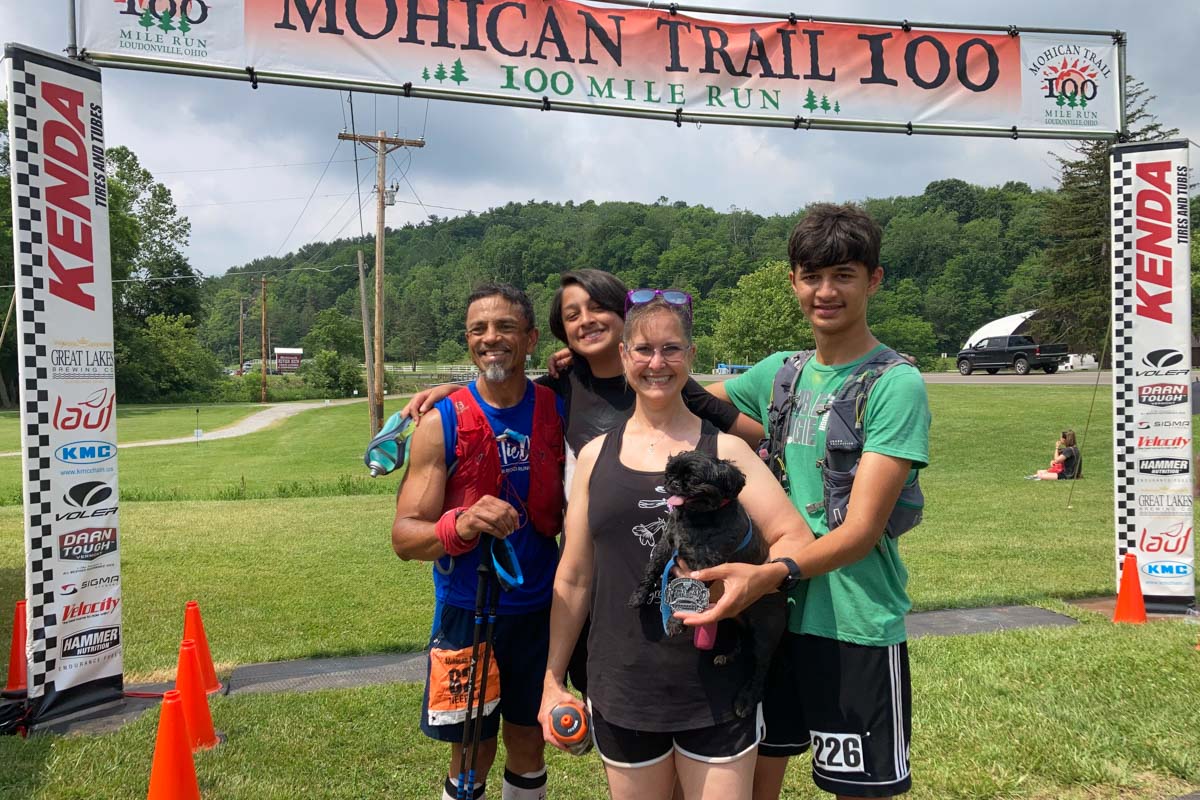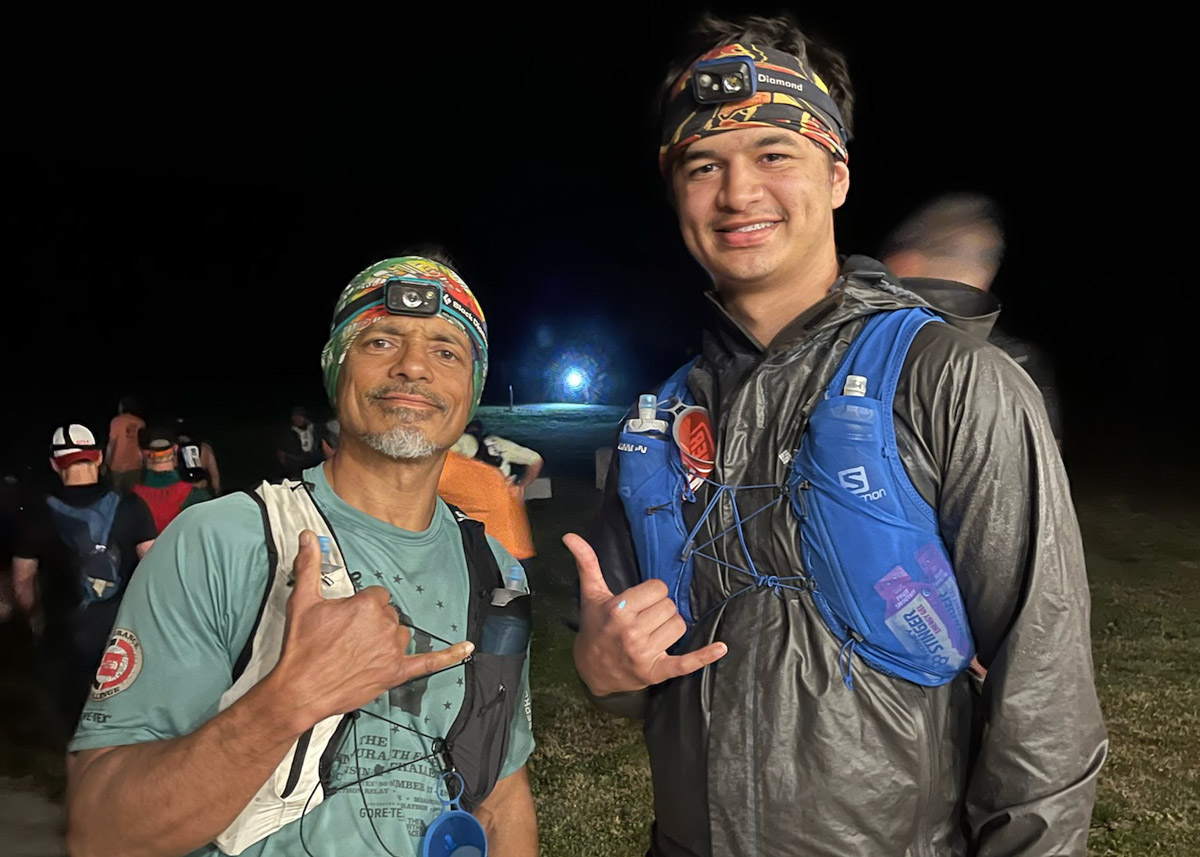When 53-year-old Neeraj Egbert of Louisville, Kentucky, entered the Placer High School track in Auburn, California, he knew he’d missed the 30-hour cutoff for the 2025 Western States 100 by just a few minutes.
The final hour of the event, known as Golden Hour, turns the high school track into one of the most raucous scenes in North American trail running, with the crowds and cheers for the finishing runners increasing as the minutes tick down. But often, it’s not an actual race finisher who gets the loudest cheers from the crowd, but those in Egbert’s position, who arrive to a blank race clock after completing the 100 miles beyond the cutoff time.
Crossing the finish line, Egbert had already come to terms with missing the cutoff. He had no idea something special was about to happen when race organizers asked him to show up at the awards ceremony a little while later. Egbert, an immigrant from India who initially came to the U.S. in 1994 on a three-month work program with the YMCA and eventually became a physical therapist serving underprivileged and mostly immigrant communities in Louisville, Kentucky, showed up to the awards ceremony wearing a shirt that said, “Here for the Immigrants.” He would never have dreamed that after seven years of applying for the Western States lottery and finishing outside the cutoff, he’d find himself the recipient of the brand-new Golden Hour Ticket. Presented by Western States 100 sponsor, the Man Against Horse Race, the award is given to the first person across the line after the race clock is turned off, and the award comes with a guaranteed spot in next year’s race.
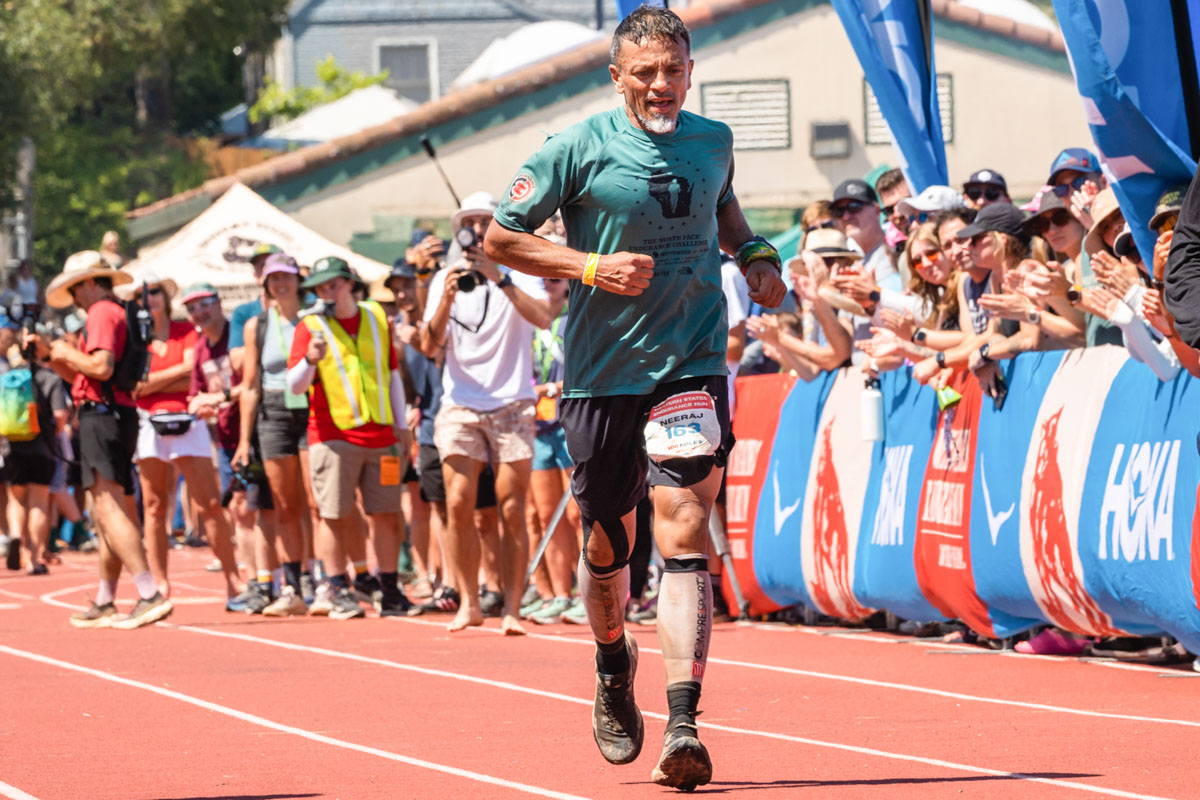
Neeraj Egbert runs to the finish line of the 2025 Western States 100 as the first person over the cutoff time. Photo: iRunFar/Eszter Horanyi
The magnitude of the opportunity isn’t lost on Egbert, who spent most of his life avoiding running due to his poor body image. He thought he was too slow and overweight and was convinced he didn’t have the ability or talent to run. In 2011, at age 39, curiosity got the better of him, and he laced up a pair of running shoes.
Running wasn’t just physical outlet for Egbert, who grew up in New Delhi, India, with minimal athletic encouragement or ambitions; it was emotional healing. While at first he hid is running, choosing to do races far from his home in Louisville, as Egbert’s running journey progressed, he saw it as an opportunity to connect with others, find acceptance and unconditional support, travel throughout the country that he now is a citizen of, spend time with his sons who pace him at events, and encourage his physical therapy patients to try the sport. Over time, Egbert has become more comfortable in his persona as a runner and stopped trying to hide.
Now, after being brought on stage at the Placer High School track, with the eyes of Western States upon him, to learn that he had the opportunity to return in 2026, Egbert has embraced the attention, saying, “This is crazy, this is just totally impossible. I’m the most unlikely person.”
Growing Up in India
Egbert spent most of his childhood in New Delhi, where he went to a Catholic school, his family having converted to Christianity during the British occupation of the country. He was in the minority amongst a population of kids who were mostly Hindus and Sikhs, but he says, “Growing up as a kid in India, religion didn’t matter,” and having friends of different religions often proved advantageous. Egbert would accompany his friends to their temples and Gurudwaras and says, “I would get the best food there. I would just follow them in and eat all these sweets, and that was the best time.” He says everyone was welcome regardless of faith or belief.
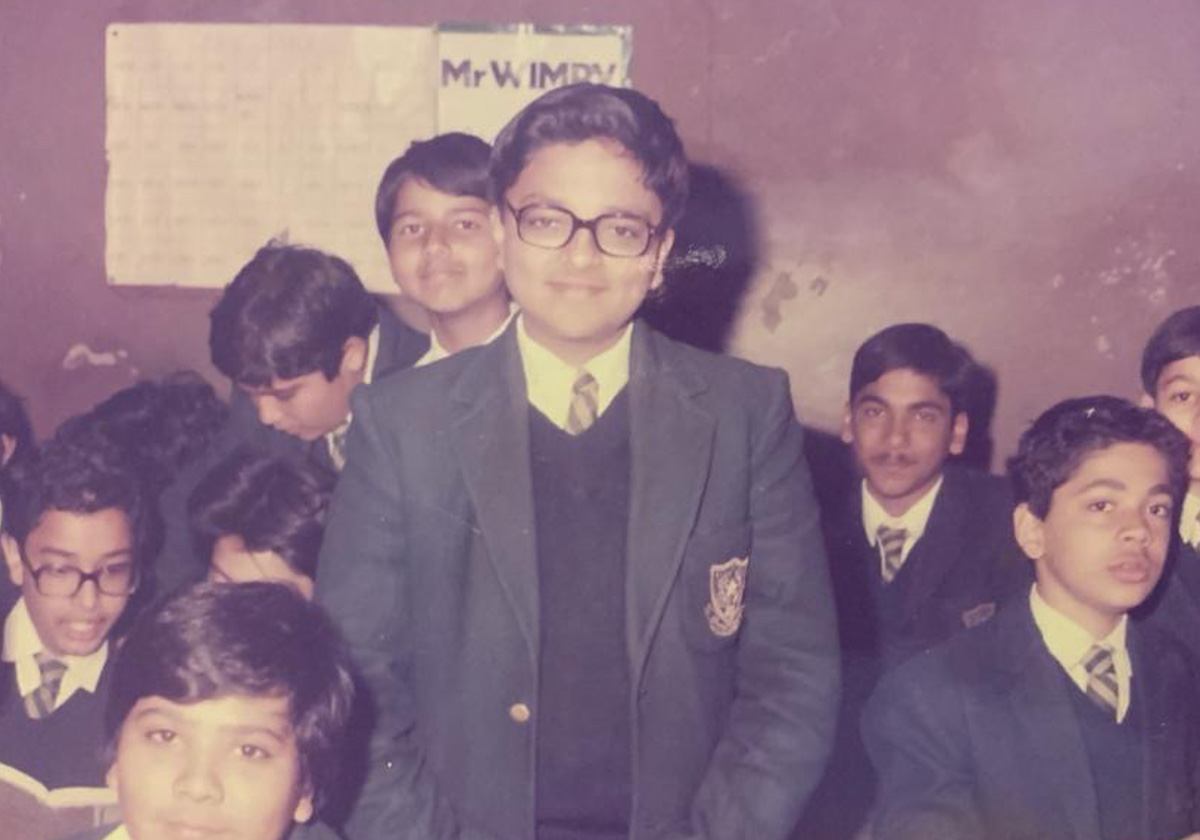
Glasses and flat feet didn’t help foster any athletic ambitions in Egbert as a child. All photos courtesy of Neeraj Egbert unless otherwise noted.
When it came to athletics, Egbert describes himself as “the slowest kid in the class.” He was not encouraged to be active, as academics and scores in standardized tests were the only important things, and he says his mom showed her love through food. He was often the last picked for any sports team, except for tug-of-war, when he was valued for his weight. “By the time I turned 18, I weighed 200 pounds. I couldn’t walk to the bus stop, which was about five minutes away, without being drenched in sweat. I could not move.”
Even though Egbert’s father worked at the YMCA and he had access to a fitness center and pool, he never learned to swim due to body image issues — a fact that he lamented at the Rucky Chucky river crossing at Western States as an adult 40 years later. He quips jokingly, “I knew at Rucky Chucky I should have worn a flotation device because I’m the guy who is most likely to get swept away and drowned, and that would be the never-ending story of Western.”
In addition to his weight and love for sweets, Egbert had a lot going against him for participating in athletics. For one, he was flatfooted. He also started wearing thick glasses at age seven. As he puts it, “Competitive sports were pretty much out.”
American Opportunity
Egbert had finished three years of college when he saw an ad for a three-month exchange program in the U.S. through the YMCA. He applied and was accepted, and in 1994 at age 22, he got on a plane for the first time and touched down in New York City. For the first time in his life, he didn’t have his mom doing his laundry, cooking his meals, and taking care of many of the details of his daily life. For a week, he enjoyed the bustle of the city while attending the orientation program at the International YMCA in Manhattan, and then relocated to Louisville, Kentucky, for the job.
If New York City was exciting, Louisville was a culture shock.
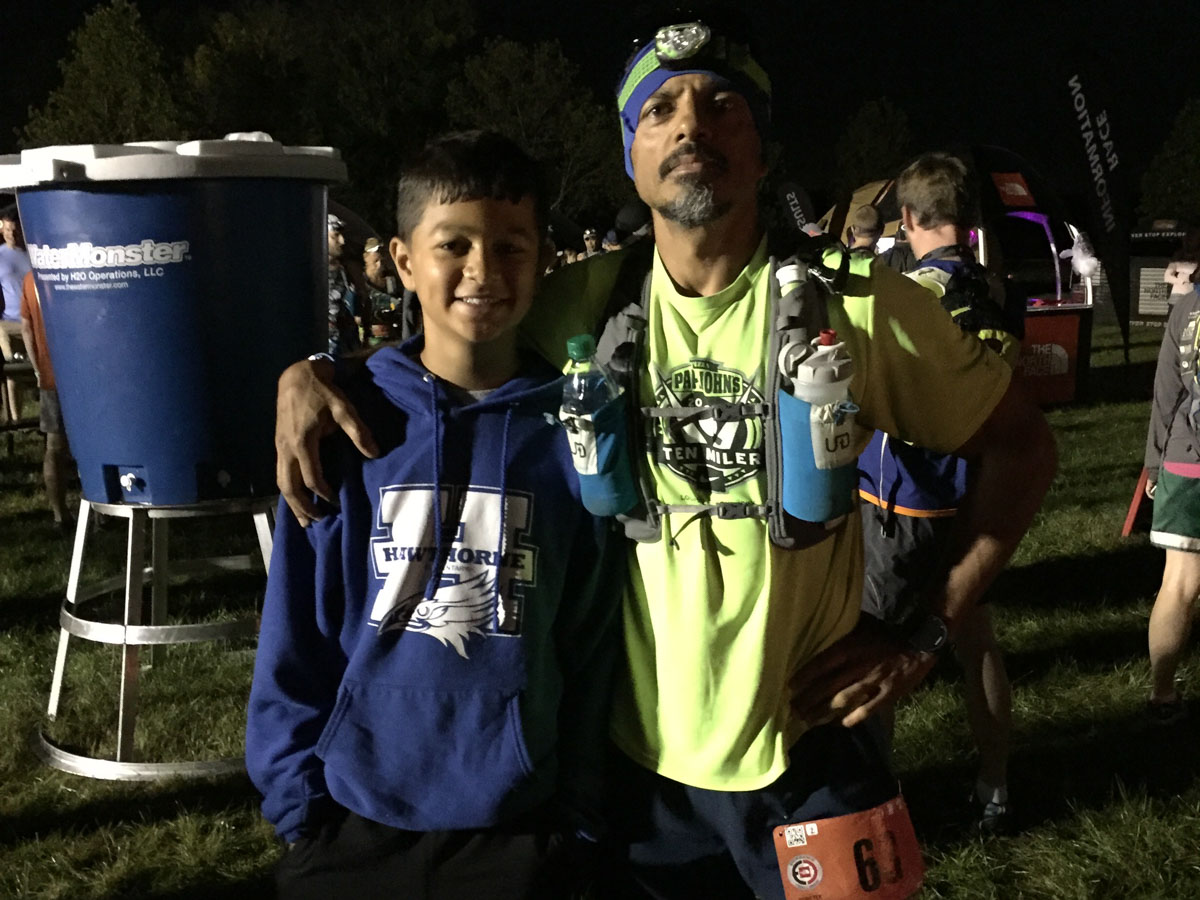
Egbert and his son at the start of The North Face Endurance Challenge 50 Mile in 2016, his first ultra.
Yet, after initially getting off the plane for summer camp work with a button-down shirt and trousers, leading to a bewildered look from the YMCA representative who picked him up, Egbert thrived. His host family offered to let him stay with them as long as he attended school. Two years later, Egbert met his wife, and in 2000, they married. Soon after, Egbert started his doctorate in physical therapy at Washington University in St. Louis, Missouri, one of the top schools in the country in the field. He finished the degree, got a job, and started a family. In 2010, he became a U.S. citizen and says, “It was, and still is, the proudest day of my life.”
Throughout this entire time, Egbert hated running. He’d lift weights for exercise, but he says, “I had the mindset of the orthopedic doctors I work with who say, ‘Don’t run. It will hurt your knees. You’re going to take years off your life.’” It took him a trip back to India to realize that it wasn’t the actual act of running he disliked but the childhood emotions he had attached to it.
Healing Through Running
In 2011, shortly after becoming a U.S. citizen, Egbert took a trip to India to visit family. “I went back to my old school, walked around there, and realized how much I had changed.”
The insight made him realize that the embarrassment he’d endured as a child didn’t need to continue influencing his life. A big part of that trip involved visiting family and friends, which inevitably involved a lot of eating. He says of a particular meal during that trip, “I had eaten so much food, I couldn’t stand it anymore,” so he went out in the middle of New Delhi and went for a run. He says, “I probably ran a mile and was beat.”
That run sparked something in Egbert, both physically and emotionally. He says he started to realize, “I’m capable. I can do this.” He kept up the running after the trip, slowly discovering that perhaps the sport wasn’t as bad as he’d thought it was for the entirety of his life up to that point. The distance seemed huge when his wife convinced him to run a 5k.
But he went out and did it and says, “I came back from that 5k and felt something was right about it. I felt it was therapy for me.” Egbert continues, “Compared to anything I’d experienced in the past, it was an outlet.”
Still, Egbert felt self-conscious about running where people he knew would see him, so in 2015, he traveled to a half marathon in Columbus, Ohio, to try the distance outside the eyes of anyone in his community. He says of the experience, “I don’t think I even had my shoes laced up correctly.” In 2016, he ran a full marathon, which was followed shortly by his first ultra, The North Face Endurance Challenge 50 Mile in Madison, Wisconsin.
While his two sons traveled with him for events, he still didn’t want anyone in his day-to-day life to know about his running, so he continued to travel to races away from his home area. While visiting the often small communities that play host to events, he discovered that it was in these places that he felt the most comfortable.
The Western States 100 Journey
Like many starting their ultramarathon journey, Egbert read the book “Born to Run” and was immediately inspired. He says, “I looked up Western States and then UTMB, and I was like, ‘Ok, I’ve got to do these things.’” In 2017, Egbert started his quest of gathering lottery tickets for Western States. This journey dovetailed easily with his desire to travel, especially to small towns throughout the U.S., and his new goal to run an ultra in each of the 50 states. Egbert found himself at home in the small towns, saying they’re often “the true spirit of the state.”
Egbert says, “In a way, [travel] is kind of reassuring for myself and my family, that this is a beautiful place. America is a beautiful country, and it’s got amazing people.”
After seven years of putting in for the Western States lottery, Egbert finally got his chance to run in 2025.
As someone who works full-time, has a family, and didn’t come into running until later in life, Egbert had realistic goals for the event. He says, “I’m not fast. My mechanics are terrible, but I could push myself to discomfort. And to me, there was a certain accomplishment in that.”
For Egbert, the discomfort started early. Within the first 20 miles, he developed blisters on his feet. By the time he made it to Robinson Flat, 30 miles in, he says, “It was like running on bags of water. And it hurt like crazy.” But Egbert wasn’t going to quit. He had his two sons lined up to pace him later on, and this had been his dream since the start of his ultrarunning journey.
He picked up his son, Sahil, as a pacer at Rucky Chucky, mile 78, and says, “Sahil pushed himself as hard as he could up the climb to Green Gate. I was like, ‘This is more important to me, this experience, than anything.’” Egbert’s sons had supported him in several races, including pacing through thunderstorms and mud, and their involvement meant everything to him. “It’s blasphemous to think that anything’s more important than finishing Western, but I got to run with my kid for 14 miles and that experience will stick.”
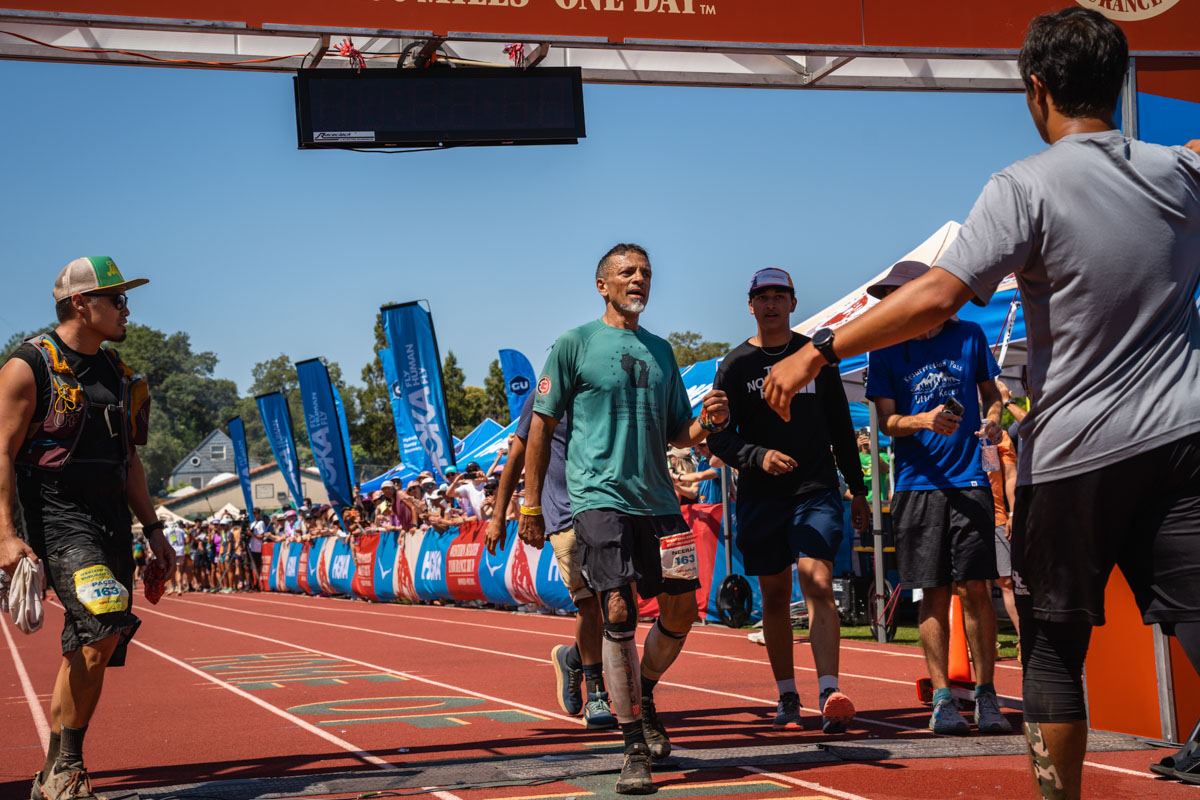
Egbert is greeted at the finish by his family and a huge crowd, but a blank clock. Photo: iRunFar/Eszter Horanyi
Throughout the later miles of the race, Egbert forged on near the back of the field, saying, “We got to Pointed Rocks, mile 94, and I thought my race was over because everybody had gone.” His youngest son, Rehaan, who was going to pace until the finish, wasn’t feeling well, so a different pacer stepped in. With the cutoff looming, Egbert says, “I wanted to experience the whole course. I really did. I told my wife in the morning, ‘I’m going to keep going till I can’t go anymore.’”
Egbert came into the Placer High School track to the crowd’s roar. He says, “I knew I hadn’t finished in time. I think the biggest thing was that it was so painful.” But even then, Egbert was pragmatic about the results, saying, “I was like, ‘Ok, the journey is that I’m actually here at Western States.’” And at the time, that was enough. “I had my experience.”
Second Chances
Soon after Egbert crossed the finish line, Topher Gaylord, the Western States Board President, and race director Craig Thornley approached him and asked him to attend the awards ceremony. Not knowing what would happen, Egbert asked his wife to get his shirt, which read, “Here for the Immigrants,” for him to wear. He says, “It was my way of saying something positive. I support the immigrants, I support myself, we support people.” Being called up in front of the crowd to receive the Golden Hour Ticket was an opportunity bigger than just racing again next year. It was a chance to bring awareness to something Egbert cares deeply about.
Egbert says, “I’ve never felt more accepted. That’s why I love trail running.” But when it comes to inclusivity, he says it’s important “for the whole community, for people to know that we can be more vocal about it.”
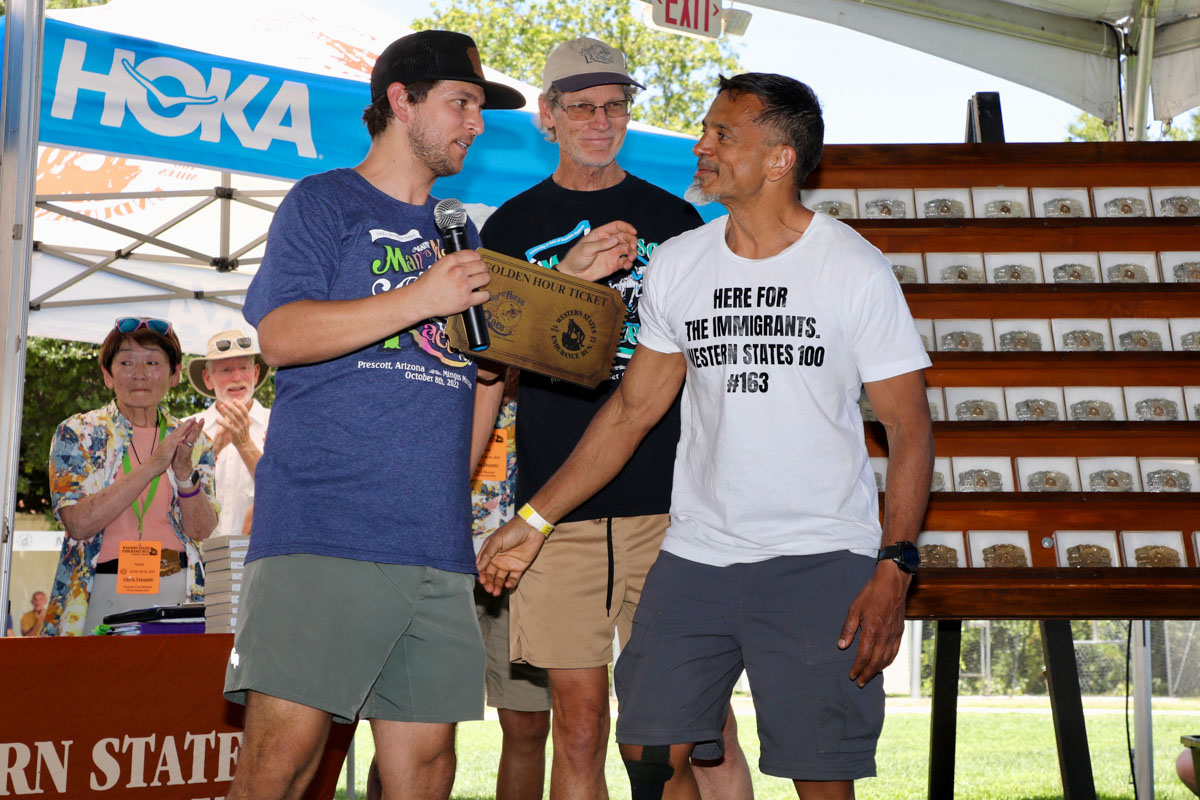
Egbert receives his Golden Hour Ticket and an entry into the 2026 Western States 100. Photo: iRunFar/Bryon Powell
When it comes to lining up for Western States again next year, Egbert would love to finish under the time cutoff, but perhaps more important for him is getting the opportunity for his youngest son, who had to sit out from pacing this year, to join him for some miles in 2026.
“I cannot believe how lucky I am that I get a chance to do this again.”
Call for Comments
- Calling all stories about Neeraj Egbert! You know what to do in the comments section.
- Were you following the 2025 Western States 100 Golden Hour? Did you see Egbert’s finish?
